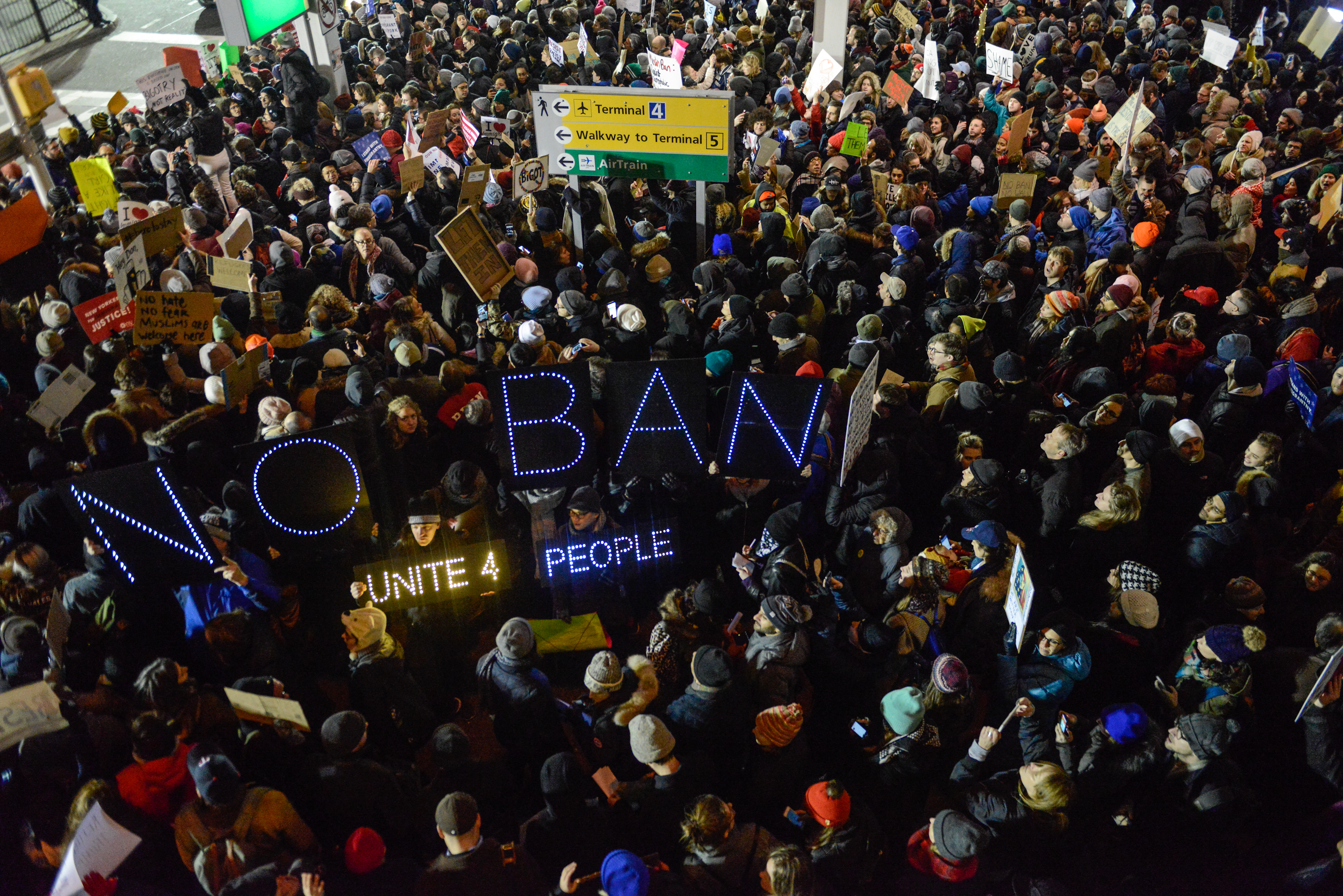Where was the liberal uproar over Obama's wars in the Middle East?
On the list of enormities inflicted on the Middle East by American policy in the last 20 years, President Trump's visa ban, for all its crudity, would not rate in the top 25


President Donald Trump's executive order on immigration was stupid and counterproductive.
Because of its broadness — it restricts the travel of citizens from seven majority-Muslim nations, reduces the number of refugees America takes in, and bars all Syrians from obtaining refugee status indefinitely — the order offended the conscience of many American allies. And because of its broadness, it is of no substantial security benefit whatsoever. And because it was rolled out with maximal legal confusion, it swallowed up sympathetic refugees in delays, or sent them home on return flights, and inspired a minor social and legal panic. And because it was rolled out with Trump's typically boneheaded explanation, it seemed to set the suffering of Christians against the suffering of Muslims and those of other faiths.
And in the panic it set off, including the surprisingly large protests around the country, it revealed something stupid and counterproductive about our politics as well. On the list of enormities inflicted on the Middle East by American policy in the last 20 years, this temporary visa ban, for all its crudity, would not rate in the top 25. And yet it occasioned more stormy dissent than any single American decision in that region except the beginning of the Iraq War in 2003. Why?
The Week
Escape your echo chamber. Get the facts behind the news, plus analysis from multiple perspectives.

Sign up for The Week's Free Newsletters
From our morning news briefing to a weekly Good News Newsletter, get the best of The Week delivered directly to your inbox.
From our morning news briefing to a weekly Good News Newsletter, get the best of The Week delivered directly to your inbox.
Just consider the numbers involved. The U.N. estimates that that there is a global population of 65 million people displaced by war and persecution. Of these, approximately 21 million are refugees, over three million are asylum seekers, and over 40 million people are displaced within their own country.
If we scope down to where Trump's ban is most stringent, Syria, we find that there are 4.8 million Syrian refugees out of its borders, and nearly six million more displaced within the country. These are massive numbers, but U.S. refugee and visa policy affects only a minuscule number of them. The United States admitted 85,000 refugees in total last year, roughly the population of Nashua, New Hampshire. Only 12,486 of these were Syrians.
The truth is that if you want to protest U.S. actions that affect refugees in the Middle East, migration policies are relatively marginal to the problem, compared to America's foreign policy.
Of the seven countries in Trump's ban, the U.S. military is operating in all but one of them. The U.S. knocked over the governments of Iraq and Libya, creating instability and sectarian conflict across the region, including in Syria. The U.S. now bombs all three of those countries in an attempt to manage their internal political turmoil. In Yemen, the U.S. is a party to Saudi Arabia's unjust and hopeless war there, providing weapons, logistical support, and even help with refueling airplanes and targeting. The U.S. is even conducting a shadow war in Somalia. Surely if Muslim lives matter, they matter when they are being bombed by our planes, or when their country is being ripped apart by our proxies, or starved by the blockades we assist.
A free daily email with the biggest news stories of the day – and the best features from TheWeek.com
These policies wreck many more Muslim lives than Trump's executive order.
For instance, the Obama administration armed and trained "moderate Syrian rebels." It encouraged them by dangling the possibility of greater U.S. involvement later. These moderates groups, like the Nour al-Din al-Zenki movement, used CIA-provided weapons, including the TOWs missile system. Amnesty International has accused them of torturing their prisoners and even beheading children. By constantly looking for on-the-ground allies to support in Syria, but without ever intervening in a decisive way, the Obama administration merely prolonged the worst civil war in years.
Just by ending the war in Yemen alone, and adequately funding humanitarian relief efforts in that country, the United States could protect many from the dangers of war or starvation, preventing many tens of thousands of people from becoming refugees in the next six months, than it would have accepted under another year of Obama's policies.
Most refugees in the Middle East don't want to go to Germany and fulfill Chancellor Angela Merkel's hope that they might support graying Germans through their final years. Most of them don't want to go to the United States either. Most of them simply wanted a safe place to land until the wars end and they can go home. That means the most effective program for the welfare of refugees is creating peace and stability. It means the most effective support will come when we support countries in the region that host most of the refugees, and push diplomatic pressure on other gulf states to do the same.
So rage at Trump's idiotic executive order, and on behalf of the thousands of refugees and travelers it affects. It's stupid. But rage much more so that Trump continues the half-dozen military conflicts he inherited from Obama, the ones in which America killed scores of thousands and displaced millions more.
Michael Brendan Dougherty is senior correspondent at TheWeek.com. He is the founder and editor of The Slurve, a newsletter about baseball. His work has appeared in The New York Times Magazine, ESPN Magazine, Slate and The American Conservative.
-
 A running list of the US government figures Donald Trump has pardoned
A running list of the US government figures Donald Trump has pardonedin depth Clearing the slate for his favorite elected officials
-
 Ski town strikers fight rising cost of living
Ski town strikers fight rising cost of livingThe Explainer Telluride is the latest ski resort experiencing an instructor strike
-
 ‘Space is one of the few areas of bipartisan agreement in Washington’
‘Space is one of the few areas of bipartisan agreement in Washington’Instant Opinion Opinion, comment and editorials of the day
-
 How Bulgaria’s government fell amid mass protests
How Bulgaria’s government fell amid mass protestsThe Explainer The country’s prime minister resigned as part of the fallout
-
 Femicide: Italy’s newest crime
Femicide: Italy’s newest crimeThe Explainer Landmark law to criminalise murder of a woman as an ‘act of hatred’ or ‘subjugation’ but critics say Italy is still deeply patriarchal
-
 Brazil’s Bolsonaro behind bars after appeals run out
Brazil’s Bolsonaro behind bars after appeals run outSpeed Read He will serve 27 years in prison
-
 Americans traveling abroad face renewed criticism in the Trump era
Americans traveling abroad face renewed criticism in the Trump eraThe Explainer Some of Trump’s behavior has Americans being questioned
-
 Nigeria confused by Trump invasion threat
Nigeria confused by Trump invasion threatSpeed Read Trump has claimed the country is persecuting Christians
-
 Sanae Takaichi: Japan’s Iron Lady set to be the country’s first woman prime minister
Sanae Takaichi: Japan’s Iron Lady set to be the country’s first woman prime ministerIn the Spotlight Takaichi is a member of Japan’s conservative, nationalist Liberal Democratic Party
-
 Russia is ‘helping China’ prepare for an invasion of Taiwan
Russia is ‘helping China’ prepare for an invasion of TaiwanIn the Spotlight Russia is reportedly allowing China access to military training
-
 Interpol arrests hundreds in Africa-wide sextortion crackdown
Interpol arrests hundreds in Africa-wide sextortion crackdownIN THE SPOTLIGHT A series of stings disrupts major cybercrime operations as law enforcement estimates millions in losses from schemes designed to prey on lonely users
